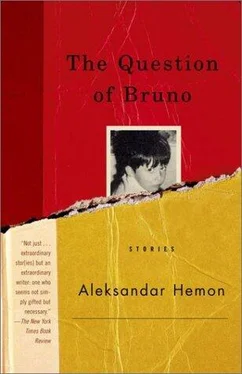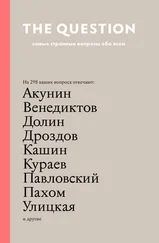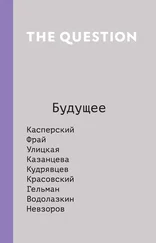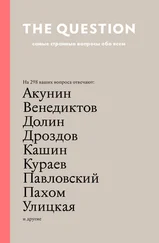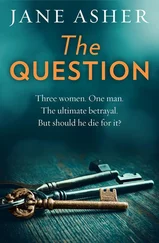Venykov had a bath and shaved, but wore the same shirt as before (a white shirt with a pear-pattern, including leaves on the stalks). We had breakfast — Venykov enthusiastically ate away a heap of bananas (Mother informing me, by a weighty glance, that bananas are not to be touched, except by Venykov), entirely ignoring the boiled eggs and sausage. “It’s hard to come across bananas in Leningrad,” my father translated Venykov’s bananapeeling remark. After the breakfast, Venykov opened one of his (two) suitcases and pulled out, one by one, a throng of rotund matyoshky (we already had dozens on a remote shelf). Then he put a bottle (Stolichnaya), wrapped in a sheet of Literaturnaya Gazeta , in my father’s hands. As my father was peeling the bottle, Venykov was dismantling matyoshky , echoing each other, all facing different directions, as if blind. “Nuh!” Venykov said, touching the head of the largest matyoshka. “Nuh!”
That night we all watched Brigadoon on TV (Venykov mumbling, “Duraky!”) Despite my father’s protests, he went to sleep in his car — a Volga resembling a gigantic black cockroach, parked in front of our apartment building.
“Why doesn’t he sleep here?” I asked.
“He feels uncomfortable in a foreign country,” Father said. “He’s afraid of being treated as someone other than himself.”
I had been more or less convinced that my father was a spy, and I somehow learned to live with it. I could still catch a shadow passing over his face — a shadow of something that he had been doing and nobody was supposed to know about. He was still making phone calls in Russian, and the film multiplied. Venykov delivered to him an envelope, and he locked it in the lower drawer of his desk. The conversations they had in Russian, behind the bedroom door, or walking ahead of my mother and me, never sounded like conversations — rather like lectures or briefings. I couldn’t, however, make myself believe that Venykov was a spy — not once I saw him peeling a banana (his gaze following the descent of the peel) or devouring a baklava, or humming with Julie Andrews and making his hand dance in rhythm, while watching The Sound of Music. I figured that he could be a benign cover or just a naïve courier. 24
The Venykov weeks passed uneventfully: he was playing chess with my father (Mother: “What’s the score?” Father: “One thirty-one — one twenty-seven.”); visiting the mountains around Sarajevo; buying cheap Italian jeans from smugglers for his girls (a smuggler to his accomplice: “Get me size thirty for Brezhnev! ); going to movies 25 (You Only Live Twice, From Russia with Love, True Stories VI); talking to my father behind the closed doors. We’d watch his Volga, before going to sleep, seeing flashes of flesh as he was putting on his crimson pajamas. Near the end of the third week, at the end of the day that included a movie (Arabian Nights) , a dinner (Bosnian cuisine), and plenty of delectable Turkish coffee, Venykov agreed to sleep in my room. Lying between my parents (my sister in her crib), I could hear the hum of Venykov’s snoring, occasionally interrupted by the smacking of his lips. Mother: “He’s not going to stay forever, is he?” Father: “He’s got to go back. His wife and children are there.” Me: “Why can’t they come here?” Father: “They just can’t.”
The following day, Venykov packed up before any of us got up (although my sister bawled pitilessly, alarming us, I suppose), had a quick breakfast with us, then kissed my forehead, shook his index finger with my sister, hugged my mother and father (slapping his back dramatically), turned on the cockroach-car, and drove back to Leningrad. “He’s home,” announced my father two days later, after a brief phone conversation. In my room, Venykov left the scent of his newly purchased aftershave (Pitralon) and a crumpled brown sock under my bed.
In October 1977, my father was arrested. 26There were no screeching cars in the middle of the night, no marble-faced men in leather coats, no terrified, shivering neighbors too scared to look through the peephole, no breaking doors — not even loud fist-banging at the door. They simply called him on the phone. He hung up and said to my mother: “They want me about some traffic violation. It must be a misunderstanding. I’ll be back shortly.” He put tennis shoes (Puma) on his bare feet and was gone. He did not come back home that sleepless night or the day after. My mother was tirelessly making frantic phone calls, none of which lasted more than one or two minutes, for nobody wanted to talk to her. Her dread was increasing, and she was trying to repress it (soundlessly sobbing), while Hanna moaned all the time (refusing to eat her liquid foods). My entertaining the idea that Father was a spy had never been much more than a way to embellish my vacant childhood, but with Father’s arrest, it suddenly became palpable. My spine tingled with the pride in the ability to sense his spyness, while, at the same time, I was scared, beginning to realize that we were up against something beyond my feeble comprehension. My limbs became weightier and larger, my motion beyond my control. I constantly felt an urge to hide under the bed or in the closet, but all I could do was watch my mother swing (with ululating Hanna in her arms) back and forth, like a metronome.
Four days after my father’s vanishing, Slobodan came. He rang the bell patiently, while my mother was alternately looking through the peephole and at me, deliberating whether to open the door. “I’m a friend,” Slobodan announced. My mother opened the door, but kept it chained. “Madam,” he said and showed her the inside of his wallet. “I’m Inspector 27Slobodan.” “State security,” my mother mumbled. “No need to behave like a hysterical woman,” he said. “I’m here to help.” Mother unchained the door and let him in. He went straight to the dining room, without taking his shoes off, sat down and wiped his thick glasses and vast forehead with a handkerchief, while Mother and I watched him benumbed.
“I want you to know, madam, that we know everything. 28We have watched, we have listened, we know,” he said. “And I also want you to know that we have no hard feelings about you. We presume that you knew nothing of your husband’s activities. Had you known, you would have informed us, am I right? Feel free to interrupt me. I just feel that that pretty mouth of yours wants to start clattering. Cute children, madam. Are they yours? Just joking — they look exactly like you. What’s the little girl’s name? She’ll be an attractive woman, I’ll tell you. Feel free to interrupt me. You shouldn’t feel that way about me, madam. I’m a nice person. I love this country, you know, I think that we have something here, something like no other place in the world and I can tell you that there are plenty of people who think that way. We don’t want this country, what our fathers bled for, to be defiled — it belongs to us and we want to keep it. And if you don’t like it — well, you’re welcome to leave and go somewhere else, to America 29or wherever the hell you want. Don’t you agree with me? Tell me, don’t you think the same way?”
My mother said: “Comrade Slobodan, I want you to leave this very moment!”
“I’ll be glad to do so, but not before I take care of several wee things. I need a nice photograph of your husband, for the papers. No? Well, I’ll take the liberty of looking for this and that. You may watch — lest I be tempted to take something for myself.”
My mother retched several times, then put Hanna into the crib and hurried to the bathroom. I heard her vomiting, as if coughing.
“Women, always vomiting. Stay away from women, little boy, that’s my advice. So, tell me about your father. Do you like your daddy? I suppose you do. When I was a boy, I always had a place where I would hide precious little things, you know, marbles, and ticklish pictures and stuff. Do you have a place like that? Does your father have a place like that? Would you show me?
Читать дальше
